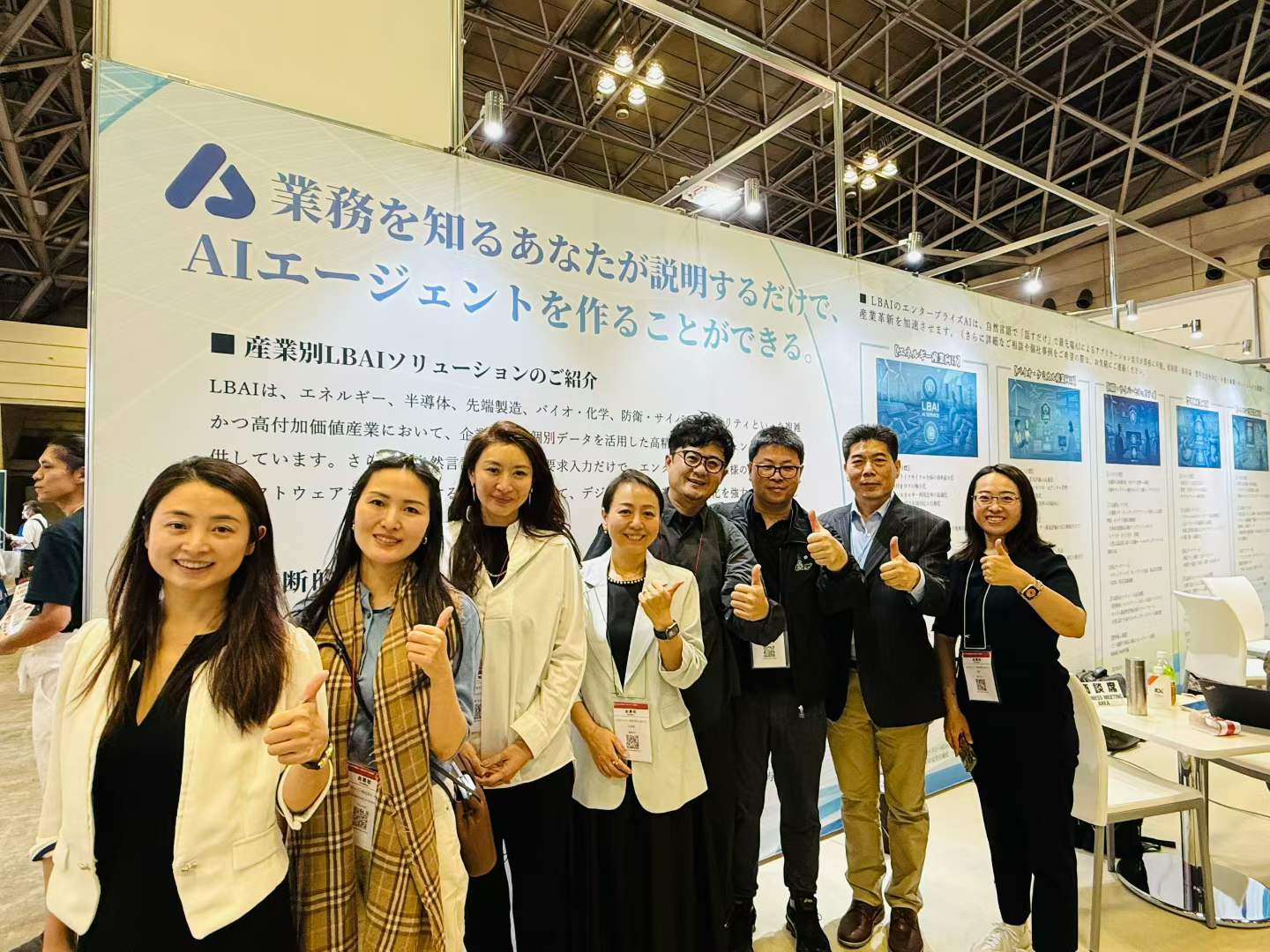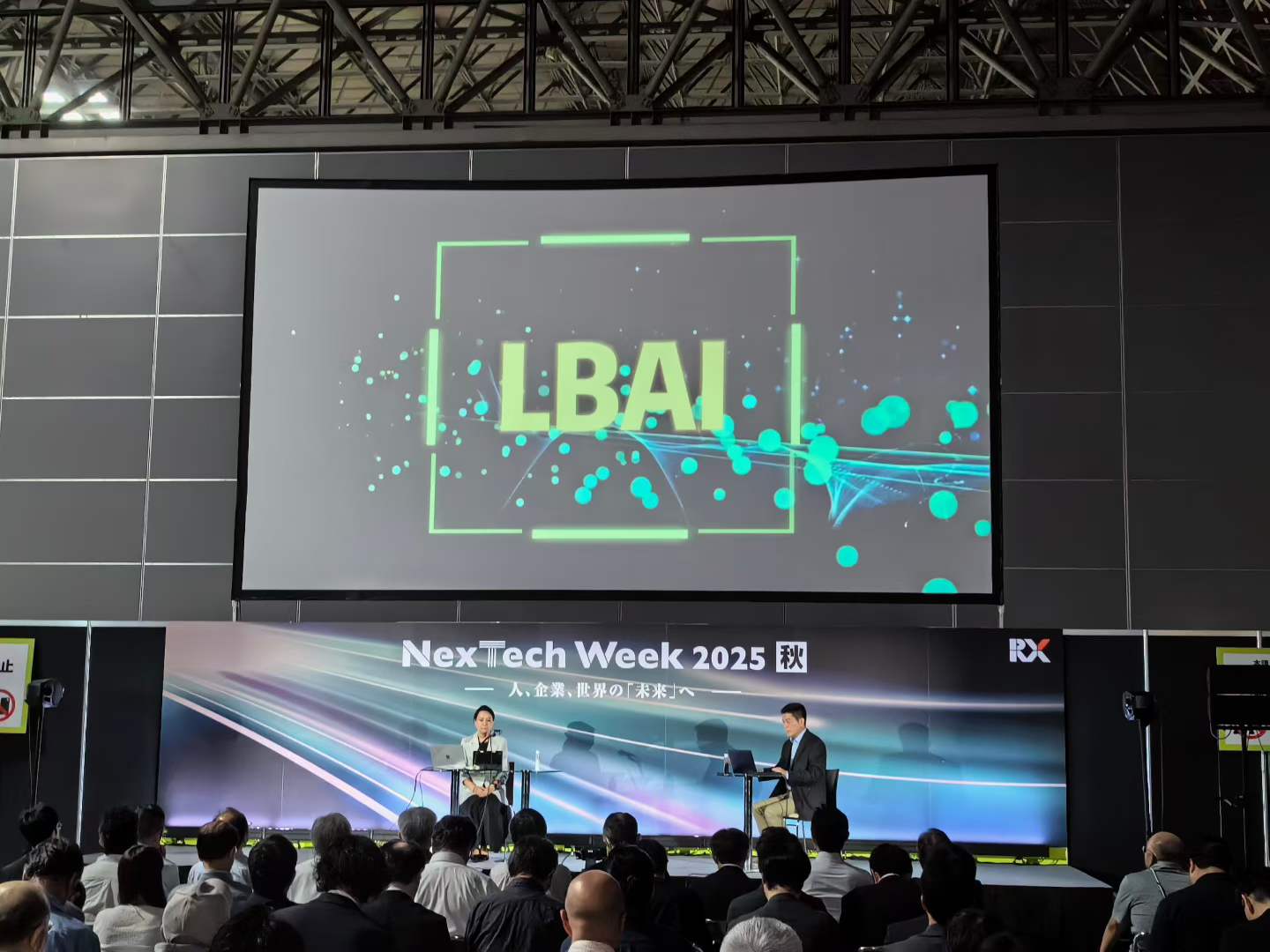
October 8–10, LBAI appeared at NexTech Week Japan (Booth: 44-71, Tokyo; venue subject to the organizer’s official notice). Over the three-day exhibition, foot traffic at the booth remained high, with guests from manufacturing, finance, healthcare, semiconductors, and energy visiting in large numbers. On October 10 (Fri) 12:00–12:45, the keynote “Evolving into Future-Ready Enterprises — Driving Onsite Transformation with AI Post-Training” was co-presented by Dr. Hashiba, Founder of LBAI Japan, and Dr. Qian Wang, Senior Advisor at LBAI, who also conducted detailed Q&A on site. They offered systematic solutions around auditable ROI, compliant deployment, and week-level go-live. Many attendees scheduled 1:1 deep-dive sessions after the demo, focusing on how to rapidly compile natural-language requirements into governed, production-grade applications, and how to close the loop to drive SFT and private/enterprise fine-tuning for week-level evolution and auditable ROI.
Onsite Chronicle and Trend Insights: Enterprise focus has shifted from “Can we?” to “How to be stable, how to be fast”
Clearer demand profile:
How to launch quickly within compliance boundaries
How to make ROI concrete, auditable, and reproducible
How to use post-training to precisely fill scenario gaps and achieve week-level evolution
Strong convergence of industry concerns:
Manufacturing/Semiconductors: flexible scheduling for multi-SKU small lots, quality inspection, equipment health, supply chain resilience; emphasis on on-prem/private deployment and non-disruptive upgrades.
Finance/Healthcare: data sovereignty, data residency, and auditable compliance (APPI/GDPR/CCPA/HIPAA); no “black boxes.”
Energy/Public Utilities: cross-system data integration, real-time orchestration with security governance; requires rollback and accountability.
Engagement and intent: Many guests, after hands-on demos, booked on-the-spot 1:1 deep dives, focusing on “how to compile natural-language requirements into governed applications” and “how to use an evidence-chain closed loop to drive SFT and private fine-tuning, training only what’s needed.”
Keynote Recap: Authoritative answers to five key questions
How to make ROI “auditable and reproducible”
Anchor on KPIs and build a quantifiable iteration framework; bind each improvement cycle to baseline benchmarks, red-team checks, and regression thresholds
Construct an evidence chain via “one-fact-two-views” receipts (HTTP return + SSE timeline), four-stream logs, and versioned manifests to ensure reviewability and traceability
How to land compliance and data sovereignty
Training/inference/deployment all executed within the customer’s private environment (meeting APPI/GDPR/CCPA/HIPAA)
Tool whitelists, write/delete confirmations with preflight checks, deterministic receipts, and versioned manifests form a governance-first path to production
How to accelerate delivery from months to days
Zero‑Touch integration via ActivationPack: unify function index, schemas/tables, page bindings, and versioning into a single variable channel, eliminating backend rewiring and enabling replication across business lines
How SFT “trains only what’s needed”
Identify real “gaps” from live application usage and auto-synthesize precise SFT pairs; a scenario-first training strategy reduces budget and lifts outcomes
Production-grade continuity and self-healing
LTS/Canary routing, a Kill-switch, and DOM idempotent patches enable zero-downtime optimization and one-click rollback, ensuring stable production and controllable upgrades
End-to-End Solution Landscape: Agent‑Native closed loop for week-level delivery and evidence-chain ROI
Natural language to governed applications (GELA)
Business describes in natural language → agent team auto-plans, generates code and UI, validates, and deploys
Strict JSON contracts, tool whitelists, “one-fact-two-views” receipts, and DOM idempotent patches ensure controllability, rollbackability, and auditability
ActivationPack enables “zero refactoring” across schema/page bindings/versioning, supporting rapid replication across business lines
Real-gap-driven SFT (wei‑plus)
Identify model “gaps” from real usage and auto-synthesize precise SFT pairs to “train only what’s needed”
Bind each training cycle to baselines, red-team checks, and regressions; gate releases on acceptance thresholds
Enterprise private model personalization (Private Llama Fine‑tuning)
Training/inference/deployment all within the customer environment to satisfy data sovereignty and regulatory requirements
Paired with LTS/Canary and one-click rollback to ensure stable production upgrades
Full-chain observability and compliance audit
Four-stream logs, versioned manifests, and deterministic receipts form an “evidence chain” suitable for CIO/CISO review
Demo and three validated outcomes with “well-known elevator” (evidence of production-grade value)
Shortened design time: agent orchestration + post-training significantly compress the iteration cycle, achieving week-level version evolution
Optimized parts procurement: compliant cross-system data connection improves efficiency and accuracy in procurement recommendations and inventory matching.
Knowledge converted into AI assets: tacit know-how is structured into “AI knowledge,” evolving in tandem with business KPIs for auditable ROI
Japan-specific rollout methodology: Governance-first, closed-loop evolution, compliance as the foundation
Private/on-prem deployment and data residency as prerequisites; reject “black boxes,” and secure with governance protocols that are traceable and rollbackable
Use ActivationPack to reduce integration complexity; use the SFT closed loop to “train only what’s needed,” focusing the budget on measurable improvements
Run an evidence chain through development → launch → evaluation → rollback, providing verifiable materials for APPI and other regulations

Voices from the floor (excerpts)
Dr. Hashiba (Founder, LBAI Japan): We emphasize “governance-first” and “closed-loop evolution”: enabling enterprises to generate and continuously optimize production-grade AI applications within compliance boundaries using natural language, with an evidence chain supporting auditable ROI. This strongly aligns with Japanese customers’ high standards for quality and privacy.
Dr. Qian Wang (Senior Advisor at LBAI, Head of North America Market & Investment): Post-training turns “real business gaps” into “small and precise” data and upgrades. Every improvement is bound to KPIs, transforming model gains into measurable business outcomes.
Why LBAI is the answer “from pilot to production”
Not a “prompt wrapper,” but a “governed application factory”: strict JSON contracts, tool whitelists, DOM idempotent patches, and “one-fact-two-views” receipts form a stable governance track
Zero‑Touch integration and agent-led automated deployment compress the “first production app” from months to days
Closed-loop training turns live applications into training samplers; model improvements immediately lift app performance, compounding ROI
LTS/Canary routing and a Kill-switch make upgrades “controllable, rollbackable, and auditable,” enabling “zero-downtime optimization”
About LBAI LBAI is an enterprise AI-native application factory that compiles natural-language business intents into runnable, reversible, and auditable production applications; strict contracts and agent teams enable Zero‑Touch deployment and closed-loop self-evolution. Core products include:
GELA : generates governed code and UI from natural-language requirements and auto-deploys, with built-in strict JSON contracts, “one-fact-two-views” receipts, DOM idempotent patches, and tool whitelists
wei‑plus: converts “real gaps” in applications into precise SFT pairs, driving private enterprise model (Private Llama) fine-tuning and controlled releases to “train only what’s needed” for targeted improvements
Enterprise private model training and deployment: training/inference/deployment fully within the customer’s private environment, paired with LTS/Canary and one-click rollback, meeting APPI/GDPR/CCPA/HIPAA compliance requirements
Conclusion With “governance-first, closed-loop evolution” as its core methodology, LBAI’s successful wrap at NexTech Week not only highlights the strong alignment between Japan’s emphasis on quality and privacy and LBAI’s approach, but also offers a replicable paradigm for “week-level delivery, evidence-chain ROI, and zero-downtime optimization” to enterprises worldwide. After the event, LBAI will initiate scenario-based pilots and architecture assessments for key industries, continuously translating the value of “Post-Training + Agent‑Native Closed Loop” into visible, auditable business growth.